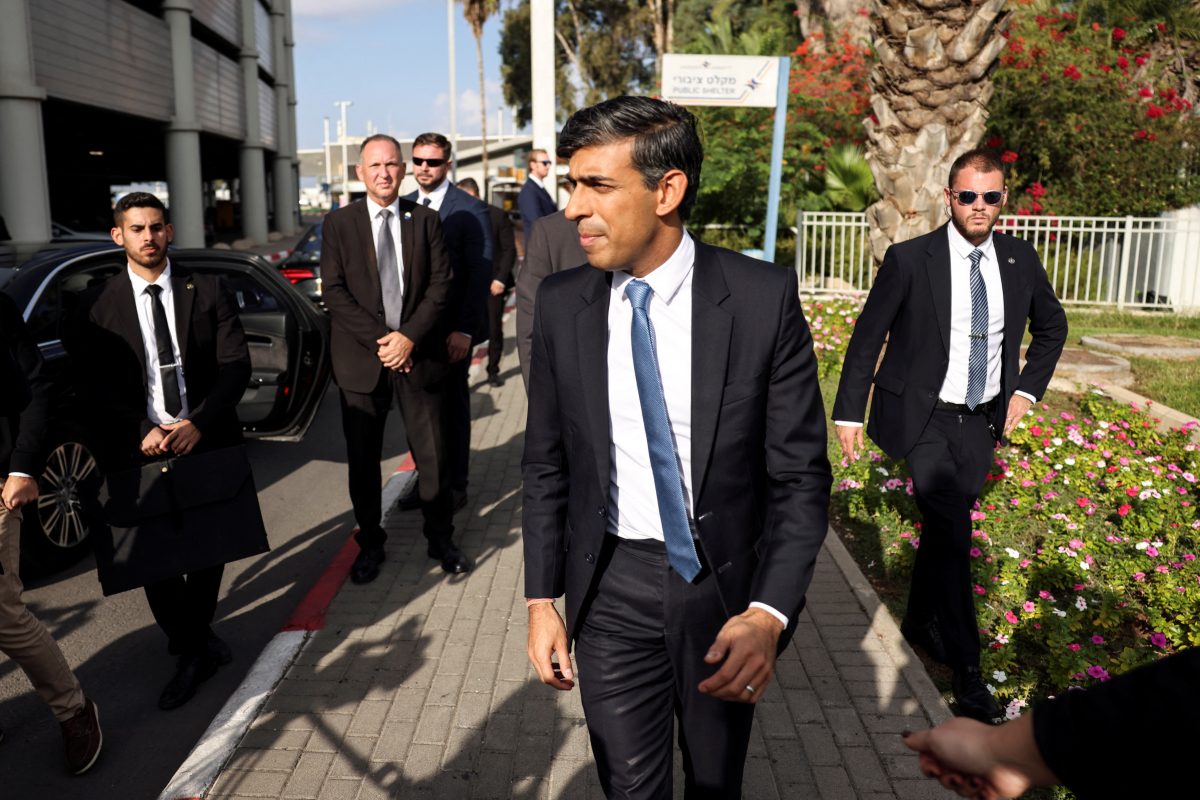GAZA/JERUSALEM, (Reuters) – Israel pounded Gaza with more air strikes today, as British Prime Minister Rishi Sunak followed U.S. President Joe Biden on visits to demonstrate support for the war against Hamas while urging Israel to ease the plight of besieged Gazans.
Sunak, who landed in Tel Aviv hours after Biden left, borrowed a phrase associated with Churchill, promising to stand by Israel “in its darkest hour” following the Oct. 7 rampage by Hamas gunmen who killed 1,400 Israelis.
“Above all, I’m here to express my solidarity with the Israeli people. You have suffered an unspeakable, horrific act of terrorism and I want you to know that the United Kingdom and I stand with you,” Sunak told Israeli reporters after landing.
Later appearing beside Prime Minister Benjamin Netanyahu, he said: “I know that you are taking every precaution to avoid harming civilians in direct contrast to the terrorists of Hamas which seeks to put civilians in harm’s way.”
Biden flew home on Wednesday night after an eight-hour trip having pledged to stand with Israel but having only limited success in his other mission, to persuade Israel to ease the plight of 2.3 million Gazans under a total siege.
Biden said he had secured an offer from Egypt to allow 20 aid trucks to reach Gaza in coming days, still a fraction of the 100 per day that U.N. aid chief Martin Griffiths told the Security Council were needed.
Two Egyptian security sources said equipment was sent today through the crossing to repair roads on the Gaza side for aid to cross. More than 100 trucks were waiting on the Egyptian side although none were expected to cross before Friday at the earliest.
Israel said it would allow limited aid to reach Gaza from Egypt, but only provided none of it benefited Hamas. It repeated its position that it will open its own checkpoints to let in aid only when all of the more than 200 hostages captured by the gunmen were set free.
And it made clear there would be no let-up in its bombing campaign: “In the Gaza Strip, every place where Hamas has touched or is touching will be struck and destroyed,” a colonel identified as the commander of Israel’s Ramat David air base told public broadcaster Kan.
“We really are a war machine that knows how to do two or three times what is being done now.”
Gaza residents scoffed at the gesture of promising just 20 truckloads of aid for 2.3 million people cut off from food, water, fuel and medical supplies.
“About the aid, this is something frivolous. We want nothing from Arab and foreign countries except to stop the violent bombardment on our houses,” said El-Awad El-Dali, 65, speaking near the rubble of ruined homes.
Health officials say bombing has so far killed nearly 3,500 people and wounded more than 12,000.
In Khan Younis, in the south of the Gaza Strip, an area of shops was reduced to rubble as far as the eye could see, with a toddler’s pink cot overturned on the ground, windows blown off a clothing store and damaged vehicles.
Rafat Al-Nakhala, who had come there after obeying Israel’s order for civilians to flee Gaza City in the north, said nowhere was safe.
“I’m over 70 years old, I’ve lived through several wars, it’s never been like this, it has never been this brutal, no religion and no conscience. Thank God. We only have hope in God, not in any Arab or Muslim country or anyone in the world, except for God.”
Elsewhere in Khan Younis, a man kissed the body of small baby wrapped in a shroud before it was lowered into a grave. Mourners said four small children were buried there and three others at another site, among a family killed when a three-storey building was hit.
In Gaza’s north, footage obtained by Reuters from the Jabaliya refugee camp showed residents digging with their bare hands inside a damaged building to free a small boy and girl trapped under masonry. The body of a man was hauled out of the ruins on a stretcher as residents tried to light up the site with torches on their mobile phones.
The United Nations says around half of Gazans have been made homeless, still trapped inside the enclave, one of the most densely populated places on earth.
The plight of Gaza civilians has enraged the Middle East, making it harder for Biden and other Western leaders to rally Arab allies to prevent the war from spreading.
An explosion at a hospital in Gaza on the eve of Biden’s visit scuppered his plans to meet Arab leaders, who called off a summit with him. Palestinians blamed the explosion on an Israeli air strike; Israel said it was caused by a failed rocket launch by Palestinian fighters, and Biden said U.S. evidence supported the Israeli account.
It fell to Sunak to be the first Western leader to visit an Arab country since the war broke out. He was due to travel after Israel to Saudi Arabia to meet with Crown Prince Mohammed bin Salman, who had been on the brink of agreeing to normalise relations with Israel before the Hamas attack.
Before Biden left, he made a plea for Israelis to rein in their wrath: “While you feel that rage, don’t be consumed by it. After 9/11, we were enraged in the United States. And while we sought justice and got justice, we also made mistakes.”
Later he told reporters aboard Air Force One: “Israel has been badly victimized but the truth is they have an opportunity to relieve suffering of people who have nowhere to go… it’s what they should do.”






